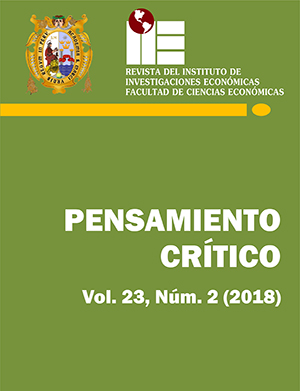ROE and financial structure of mining companies period 2004-2013
DOI:
https://doi.org/10.15381/pc.v23i2.15816Keywords:
Decouple, PBI, synchronization, rolling analysisAbstract
According to studies conducted on the international financial crisis of 2008 - 2009,
the debate on the “decoupling hypothesis” was reopened. This hypothesis reflects
the scarce transmission of negative shocks produced by industrialized economies
towards emerging countries. In the collection of studies on decoupling, readings on
the synchronization of the economic cycle between countries are found, with the
study variable being the GDP. In this investigation we will analyze the US commercial
relationship with respect to Peru with the objective of identifying the dependency
of the real economy with its commercial partner and in this way to be able to
prevent future negative external changes. To verify compliance with the decoupling
hypothesis, the econometric model is used: rolling analysis being a new model for
Peru.
Downloads
Published
Issue
Section
License
Copyright (c) 2019 Hector Gil Acuña Arone

This work is licensed under a Creative Commons Attribution-NonCommercial-ShareAlike 4.0 International License.
THE AUTHORS RETAIN THEIR RIGHTS:
a. The authors retain their trademark and patent rights, and also on any process or procedure described in the article.
b. The authors retain the right to share, copy, distribute, execute and publicly communicate the article published in Pensamiento Crítico (for example, place it in an institutional repository or publish it in a book), with recognition of its initial publication in Pensamiento Crítico.
c. The authors retain the right to make a subsequent publication of their work, to use the article or any part of it (for example: a compilation of their works, notes for conferences, thesis, or for a book), provided they indicate the source of publication (authors of the work, journal, volume, number and date).






